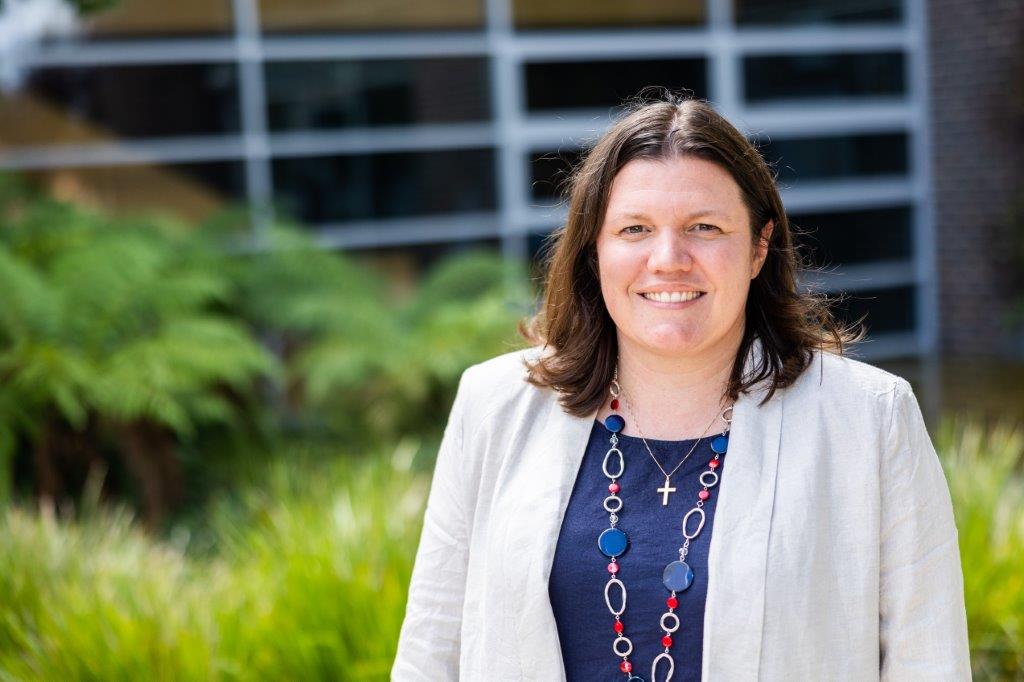Latest News

Last year Kathleen Garvie, Assistant Principal of Learning at St John Paul II College in Nicholls, became the first person in Australia to complete 10-year renewal of the prestigious Highly Accomplished Teacher certification. This puts her at the forefront of the select group of Australian educators who have attained Highly Accomplished and Lead Teacher (HALT) status.
HALT is a national initiative of the Australian Institute for Teaching and School Leadership. It’s a voluntary process where individual teachers demonstrate that they meet all the Australian Teacher Standards at Highly Accomplished or Lead Teacher level. They do this through an intense journey that involves reflecting deeply on their teaching practice, preparing a detailed portfolio and undergoing classroom observations and other assessments.
The ACT has the highest proportion of HALTs in Australia and Catholic Education Canberra Goulburn (CECG) places a high priority on supporting the certification of Highly Accomplished and Lead teachers across our schools in the ACT and NSW.
‘I was really excited to be involved’
Kathleen participated in the pilot HALT program in 2012, three years into her teaching career, and was in the first cohort to achieve certification.
Her passion for teaching grew out of her own Catholic education at Merici College in Braddon, and she returned to Canberra Catholic schools for her first teaching posts, at St Mary MacKillop College and then Marist College, where she finished a Masters of Theology and a Masters of Educational Leadership and Management and took on the Liturgy Coordinator position. It was while teaching Maths and Religious Education at Marist that she became HALT certified.
‘It was an amazing journey’
Kathleen sees her Highly Accomplished (HA) status as ‘acknowledgment by my peers and the profession of the impact I can have in a classroom, of the professional relationships I can build with students, families, staff and the community.’
‘It’s given me a deeper understanding of the teaching standards and how to ensure we are meeting the needs of every student in the classroom.’
It’s also an experience that she can share with others:
‘It means I have the obligation to continue to work to build up others in the profession and provide support where I can. It’s a way teachers can strive for excellence in their own practice, but in so doing ensure they are taking others with them.’
A spokesperson for the ACT Teacher Quality Institute describes HALTs as ‘the “standard bearers” for high-quality teaching in the classroom’.
‘It is imperative, if we want to optimise education outcomes in Australia, to have them leading from the classroom. Their ongoing efforts as formal and informal leaders within our schools, working with their colleagues to build their practice and improving student outcomes, is exactly what makes them Highly Accomplished and Lead teachers.’
‘Our teachers are learners’
‘A key element of the HALT process is acknowledging that every teacher is a leader,’ Kathleen says. ‘As leaders and educators, we must always be learners.’
A firm believer that intelligence is not fixed, she emphasises the importance of a growth mindset. If a student tells her they’re bad at maths, she responds, ‘Really? I’ve never met anyone who was bad at maths.’
This is a part of Kathleen’s own history of continuous learning and that of her colleagues, many of whom have multiple degrees and are completing postgraduate study. ‘Our teachers are learners,’ she notes.
‘Catalyst removes all the noise’
Between Kathleen’s first HALT certification and her 10-year renewal, CECG has been progressively rolling out to schools the Catalyst program of professional development to support teachers. She gives a compelling description of the difference this has made:
‘Catalyst removes all the noise of education. What we teach is critical content – what is essential for students to learn.’
‘It’s about shared expectations and mutual respect in the classroom,’ she explains of her own Catalyst-based approach to teaching secondary students.
She appreciates that Catalyst ‘puts science at the heart of teaching practice’ and that its full-participation approach takes away the possibility of opting out, as ‘students are challenged to be responsible and engaged learners’.
‘Catalyst teaching is about high-quality teaching practice and the HALT process is a way to measure this’
The fact that CECG has embraced both Catalyst and HALT is no coincidence. HALT candidates can demonstrate their proficiency in features of Catalyst’s professional development: explicit instruction and high-impact teaching.
Kathleen also notes the emphasis on evidence in both:
‘Part of the HALT process is showing through data and other forms of evidence that your students are showing significant growth. Catalyst is about high-quality teaching practice and the HALT process is a way to measure this .’
‘A Catholic education supports connection’
Reflecting on the benefits of Catholic education, particularly at a time when students may be dealing with the after-effects of isolation, Kathleen says:
‘A Catholic education supports connection with a wider network, with the church and with God. It’s an invitation for the whole family to be on the education and faith development path with the student. With this comes hope for the future and assurance for students that they are never alone.’
With Kathleen and her peers, they also have the assurance of being in highly accomplished hands.
